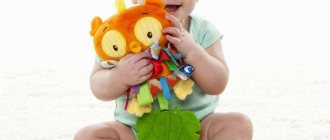Every mother eagerly waits for her baby to say his first word. Most often this word is “mother”. However, you should not rush your baby, since children’s speech skills develop at different speeds. It depends on heredity, on the sex of the child and on how often parents, grandparents, and older brothers and sisters communicate with him.
The first words are the most important
Time for conscious pronunciation of words
All parents want to know when their child says “mama.” The time for conscious pronunciation of words varies for each child and is determined by the following factors:
- Gender (boys usually start speaking later than girls);
- Heredity;
- The presence or absence of abnormalities in the development of the palate and tongue (for example, speech development may slow down with a shortened frenulum);
- Features of the bite;
- Individual temperament of the child.
The physical well-being of the baby also plays a big role. Often sick children begin to speak later than their peers.
Approximate age of first words
Diarrhea on a child's teeth during teething, how long does diarrhea last?
The question of what time children say “mom” is difficult to answer unambiguously. A healthy baby, already at 9-10 months, tries to name objects that are in his field of vision. Such speech cannot yet be called conscious. The baby simply imitates adults, copying the sounds they make. After a year, the baby begins to understand how to use speech; It is precisely at this time that the first conscious words belong. Thus, a toddler can call his dad, mom, or “babu” to him, using a specific word in relation to a specific person. When a child begins to say “mom”, “dad” and other words consciously, you can already talk to him almost like an adult.
As the year progresses, the child’s vocabulary increases significantly
Variants of the first words
Daily routine of a 5 month old baby
Statistics say that the first word in the vocabulary of 70% of children under one year old is “mom.” However, this is not at all necessary. Other options are also possible: “nanny”, “woman” or even “kisya” (if the baby is shown a cat every day and repeats its name). The first word can be any word, except those that contain consonant sounds that are difficult to articulate: “sh”, “sch”, “ts”, “r”. A young car lover can say “beep” for the first time; a girl, seeing a beautiful doll, can say “lala.” If the mother is often away, the baby may be the first to name the adult with whom he communicates most: these are grandmothers, aunts, brother or sister (“Anya”, “Lelya”, “Yulia”). Therefore, you should not wait for the child to say “mom”. Perhaps he will say a completely different word first.
In “children’s” language, the baby tries to name everything that interests him
Interesting. The baby's articulatory apparatus develops gradually. At first he pronounces only sounds (the so-called “humming”), then the consonants “m”, “n”, “l” are added to them, as the most convenient for pronunciation. Perhaps this is why the word “mother” sounds similar in all languages of the world - the sounds “m” and “a” are the easiest for a baby to pronounce.
Stimulating the baby to conscious speech
A child has a rash on his body - what is it?
When babies begin to speak their first words, it becomes a joyful event for parents. A completely healthy child can remain silent for a long time, “like a partisan,” if his parents do not encourage him to utter conscious words. It is known that the brain areas responsible for the development of speech actively develop during any manual actions: finger games, drawing, sculpting. To hear the first words faster, parents should:
- Play with your child more often in construction sets, cubes, pyramids to develop coordination and fine motor skills;
- Name the baby objects that he sees every day (cat, dog, spoon, car);
- Sing children's songs to the baby and tell age-appropriate fairy tales (“Kolobok”, “Ryaba Hen”);
- Look at children's illustrated books with your baby and make up short stories based on the pictures.
You need to pronounce all words in a conversation with your baby clearly, correctly placing the emphasis and pronouncing all the letters. If the pace of speech is too fast, the child is unlikely to understand anything, so the conversation between an adult and a child should be calm and measured. It is not recommended for your child to play modern children's songs that sound at a fast pace (for example, the Kukutiki ensemble); such music is for children aged 3 years and older.
Games for the development of fine motor skills contribute to the development of conscious speech
Factors influencing speech delay
This pathology does not arise on its own. There are a huge number of factors influencing the development of a child’s speech. Reasons for a baby's speech delay:
Intracranial hypertension
- trauma during childbirth
- brain pathologies
- dyslexia
- antenatal pathology
- mental disorder
- intracranial hypertension
- hearing loss
- underdevelopment of the muscles of the mouth and face
- injuries
If the cause of the delay in speech development has not been clarified, this significantly complicates therapy. Therefore, the child needs to undergo a comprehensive examination; this is the only way the doctor will make a diagnosis.
Helping the little “silent one”
It happens that parents are actively engaged with their baby: they sculpt, draw, sing songs and read fairy tales, but the boy (girl) is still silent. To gently and unobtrusively help your baby learn to speak, you need to:
- Visit an orthodontist and dentist (speech delay may be caused by problems with teeth or bite);
- Start weaning off the pacifier (prolonged pacifier sucking can significantly slow down speech development);
- Ask the child more often what exactly he wants, so that the baby does not show with gestures, but names objects in words;
- Tell your child about everything he sees at home, on a trip, on a walk.
It is known that children of silent parents, as a rule, are also not talkative, this is normal. Heredity plays an important role in the acquisition of speech skills. The most important thing is to work with your baby every day, then the baby’s vocabulary will begin to grow very quickly.
Under no circumstances should you put pressure on a 12-16 month old baby, forcing him to pronounce a specific word (for example, “mom”). At this age, children pronounce only what they are able to pronounce; each person’s speech apparatus develops individually. For some it’s easier to say “mom,” for others it’s easier to say “dad” or “baba.” Sooner or later, when the time comes, the baby will master all the sounds of the Russian language without exception.
If a healthy baby is silent for a long time, this is not a reason to worry
1-1.6 years
At this age, the child’s stock is replenished with 40-50 words; in addition, facial expressions and gestures are actively used to express emotions and wishes.
What can a baby under 1.6 years old say?
The main achievements of speech development are as follows:
- At 7 months, the ability to pronounce individual syllables appears, for example, “PA”, “MA”, “BA” and others similar.
- At 8 months, speech skills improve to the use of the sounds “p-b”, “m”, “g-k”, “e” and others.
- At 10 months, the child pronounces the words “DAD”, “MOM”, “LALYA”, “BABA”.
- In the first year, the baby is quite able to pronounce about 5 words consisting of two syllables.
These standards are average indicators; parents must remember that each child is individual and has his own characteristics and differences.
The baby can make short sentences (“dai ba”, “bi buh”). It is important for parents to talk with their child during this period so that their vocabulary and hearing increase.
Signs of speech delay
If after one and a half years a boy or girl continues to remain silent, a pediatrician or neurologist may diagnose “delayed speech development.” It should be borne in mind that such a diagnosis is most often made against the background of other concomitant disorders and diseases. If the baby is practically healthy, you don’t have to worry and just wait a little. You should sound the alarm if:
- The baby not only does not speak, but also does not understand the speech of adults;
- The baby does not respond to words addressed to him;
- The child does not show interest in the world around him and does not like to look at children's picture books;
- The little silent man's medical history includes congenital neurological pathologies.
Experts say that intensive speech development is facilitated by a child’s attendance at a child care facility (nursery) and age-appropriate developmental group classes, as well as active communication with older brothers and sisters (if there are other children in the family). If a baby spends a lot of time alone and is often left to his own devices, he may not utter his first words for a very long time.
Parents should monitor not only the quantity, but also the quality of the first words. Children after one year can already be delicately corrected, stimulating them to speak correctly (for example, not “bibika”, but “machine”). In order for the development of speech skills to proceed correctly, speech therapists categorically do not recommend teaching children under three years of age a foreign language, even in the form of a game.
The exception is bilingual families, where parents initially speak different languages; in this case, a healthy baby easily learns both, but this happens gradually.
Attention! If a healthy baby actively communicates with others in his own language, which no one understands, this is a variant of the norm. The child is already speaking, just in his own way for now. If a child one and a half years or older is constantly silent, is wary of others, often shows aggressiveness and refuses to communicate, this may be a sign of autism.
If the baby is already one year old, but he is in no hurry to please his elders with his first words, there is no need to panic. A healthy, physically well-developed baby will definitely speak; the main thing is to encourage him to do this by personal example. If the baby suffers from any neurological disorders or is often sick, a delay in speech development may be caused by serious disorders that require specialist supervision.
Stages of baby speech development
In order to understand how to communicate with a baby, let's look at the main stages of speech development.
Achievements up to six months
The child masters passive speech from the first weeks of life , and it is from this moment that speech can begin to develop.
Right now, the main and very important task of parents will be to actively communicate with the baby.
This will be something of a daily job for both the parents and the baby himself.
New parents need to constantly voice the baby’s emotions, comment on all his movements and always talk to him.
- Around the second month of life, the child will learn to respond to the voice of an adult and will stop screaming and crying as soon as the parents talk to him.
- Already in the third month of life, the baby will begin to laugh and respond to you with sounds.
- At the 4th month, the baby begins to say aha and gurgle (singing sounds appear), at this moment actively participate in the dialogue, changing the intonation of your voice (find out more about when the child begins to gurgle and gurgle here).
- At 5-6 months, it is no longer a simple, familiar, melodious drawl that is heard, but a repetition of real syllables. Moreover, using sounds for which you have to close your lips, such as “b”, “p”, “m”, and also pronounces the syllables “ma”, “la”, “ba”, etc. At this time, the child is already beginning to listen to the sounds he makes, repeat them, imitate you and listen to your speech.
What can a baby do under 12 months?
After six months, in addition to the fact that speech consists of repetitions of syllables, the baby begins to babble. After he has gone through all the vowels of the alphabet, he begins to pronounce sounds such as “ba-ba-ba” or “da-da-da-da” together. The baby can also already answer a question, for example, “Where?” He will actively point his finger at the object.
What does a baby say from one year to two?
In one year, a child becomes a real researcher. He is interested in everything and asks questions in his own language. At 1 year of age, a child already uses 3-4 more or less understandable words , understands simple instructions, individual words and relates them to objects. As children age, their vocabulary increases.
At 1 year and 6 months, the vocabulary increases to 20 words and the baby can show one part of the body. By the age of 2, the vocabulary increases to at least 50 words , the child shows 3 parts of the body and already uses phrases of 2 words.
What can you do from 2 years old?
At this age, the child understands two-step instructions , for example, “Go to the closet, take a book,” “Go to the crib, take a toy,” and so on.
Typically, a child at this age has a vocabulary of at least 50 words and can show 5 parts of the body.
He also understands the meaning of actions in a given situation, for example, “What do you have in your hand?” “Is this your plate?” and so on.
The child always tries to answer the question.











